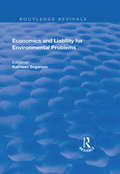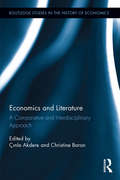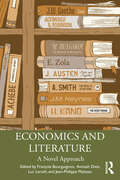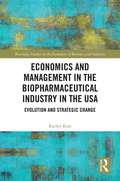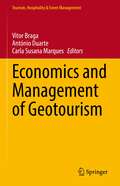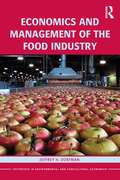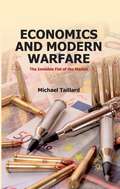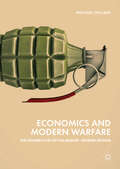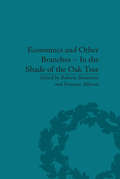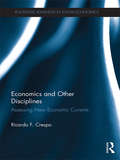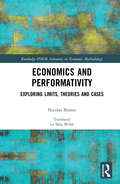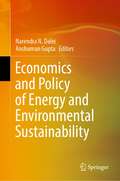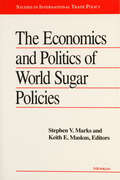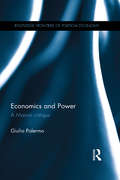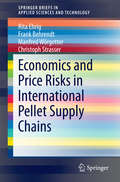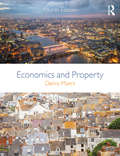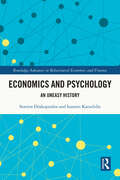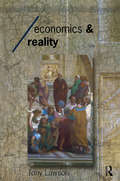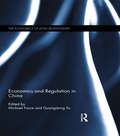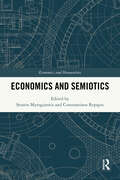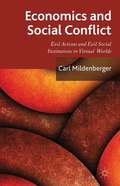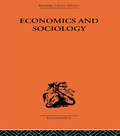- Table View
- List View
Economics and Liability for Environmental Problems (Routledge Revivals)
by Kathleen SegersonThis title was first published in 2002. This convenient reference brings together notable contributions examining all aspects of the liability for environmental accidents. Articles included in the Part I of this volume examine the role of liability as a policy instrument, and provide detailed examinations of the incentive effects created by the imposition of liability, ie. Bankruptcy, litigation costs, delegation of responsibility and insurance. Those in Part II study specific environmental issues such as hazardous waste disposal and oil spills. The International Library of Environmental Economics and Policy explores the influence of economics on the development of environmental and natural resource policy. In a series of twenty five volumes, the most significant journal essays in key areas of the contemporary environmental and resource policy are collected. This convenient reference brings together the notable contributions examining all aspects of the liability for environmental accidents.
Economics and Literature: A Comparative and Interdisciplinary Approach (Routledge Studies in the History of Economics)
by Ҫınla Akdere Christine BaronSince the Middle Ages, literature has portrayed the economic world in poetry, drama, stories and novels. The complexity of human realities highlights crucial aspects of the economy. The nexus linking characters to their economic environment is central in a new genre, the "economic novel", that puts forth economic choices and events to narrate social behavior, individual desires, and even non-economic decisions. For many authors, literary narration also offers a means to express critical viewpoints about economic development, for example in regards to its ecological or social ramifications. Conflicts of economic interest have social, political and moral causes and consequences. This book shows how economic and literary texts deal with similar subjects, and explores the ways in which economic ideas and metaphors shape literary texts, focusing on the analogies between economic theories and narrative structure in literature and drama. This volume also suggests that connecting literature and economics can help us find a common language to voice new, critical perspectives on crises and social change. Written by an impressive array of experts in their fields, Economics and Literature is an important read for those who study history of economic thought, economic theory and philosophy, as well as literary and critical theory.
Economics and Literature: A Novel Approach
by François Bourguignon Luc Leruth Avinash Dixit Jean-Philippe PlatteauEconomics and fiction often pursue parallel objectives. Economists analyze human decisions and interactions in markets and other institutions. Fiction writers also provide keen insights into individual minds and motives, examining how their characters respond to conflict and tensions in varied situations. This book explores the insights to be gained from developing this parallel.In each chapter, economists discuss classic or contemporary literary creations, exploring economic incentives that motivate the characters, the economic mechanisms that tie them together, and/or the economic context in which they live and develop. Exploring the synergy across economics and literature offers new understandings of themes, including capitalism and colonialism, marriage and markets, gender norms, inheritance and estates, and the political economy of poverty. The broad and deep range of literary works includes writers from Shakespeare and Goethe, through Chekov and Steinbeck, to recent Nobelists Abdulrazak Gurnah and Han Kang. By offering new understandings of both economics and literature, readers will gain deeper insights into people’s thought processes, choices, and consequences.This book will captivate readers in economics, social sciences, and the humanities and open their minds to the viewing of economic ideas and concepts through the prism of great works of literature.
Economics and Management in the Biopharmaceutical Industry in the USA: Evolution and Strategic Change (Routledge Studies in the Economics of Business and Industry)
by Rachel KimFrom a managerial perspective, the biopharmaceutical industry represents a competitive, fast-changing, intellectually-powered, innovation-driven sector. Many management scholars have studied this discontinuous era to make sense of strategic behavior and the cognition of firms and top managers. A past look at the biopharmaceutical industry provides answers to questions that most managers have. For example, what options do you have and what actions do you take when new firms enter your industry? In the 1970s, new biotechnology firms, funded by venture capitalists, appeared in the pharmaceutical industry with new knowledge. Successful pharmaceutical firms decided to collaborate with the new entrants and forge relationships to develop and create new, biotechnology engineered drugs. Thus, the addition of new biotechnology firms ushered in a new business model based on strategic alliances. Strategic alliances have now become an industrial norm called open innovation. The author looks at the historical path of the biopharmaceutical industry, particularly in the United States. While the pharmaceutical industry’s main contributions to society are substantial, there are pressing challenges the industry must face, such as an increase in infectious disease outbreaks or the global aging population, which require new types of care, additionally, mental health care and prescription painkiller addiction are persistent issues with economic repercussions to both federal and local governments. This book presents a holistic view of the biopharmaceutical industry, putting it in a historical context. It will best serve those who are eager to learn about this dynamic, fast-evolving industry and who would like to tackle current biopharmaceutical industry issues in the United States and be prepared for future industry challenges.
Economics and Management of Geotourism (Tourism, Hospitality & Event Management)
by Vitor Braga Carla Susana Marques António DuarteThis book covers all aspects of the economics and management of geotourism, an increasingly important sector of nature tourism that focuses on the geology and landscape of different territories, providing a pleasurable and educational tourist experience. Geotourism is a sustainable form of tourism that has the potential to deliver significant benefits to host communities. To date, however, geotourism has been examined primarily from the natural sciences perspective, to the detriment of issues related to local social and economic impacts, inter-organizational collaboration, tourist responses, and community participation. This book therefore fills a major gap in the literature. While a key focus is the impacts of geotourism on economic and social development processes and the quality of life of local populations, detailed attention is also devoted to topics such as geopark and geosystem management, innovative and entrepreneurial strategies in geotourism, and territorial marketing. In addition, readers will gain a clear understanding of the extent to which the opportunities and challenges facing geotourism reflect current trends in the tourist industry as a whole.
Economics and Management of the Food Industry (Routledge Textbooks in Environmental and Agricultural Economics)
by Jeffrey H. DorfmanThis book analyzes the economics of the food industry at every stage between the farm gate and the kitchen counter. Central to the text are agricultural marketing problems such as the allocation of production between competing products (such as fresh and frozen markets), spatial competition, interregional trade, optimal storage, and price discrimination. Topics covered will be useful to students who expect to have careers such as food processing management, food sector buying or selling, restaurant management, supermarket management, marketing/advertising, risk management, and product development. The focus is on real world-relevant skills and examples and on intuition and economic understanding above mathematical sophistication, although the text does draw on the nuances of modern economic theory.
Economics and Modern Warfare
by Michael TaillardBy referring to a handful of battles throughout history, a new form of military strategy is derived through the manipulation of supplies, capital, and markets. This book combines economic theory with applied analyses of military successes and failures, explaining them simply for audiences of all levels of interest.
Economics and Modern Warfare: The Invisible Fist of the Market
by M. TaillardBy referring to a handful of battles throughout history, a new form of military strategy is derived through the manipulation of supplies, capital, and markets. This book combines economic theory with applied analyses of military successes and failures, explaining them simply for audiences of all levels of interest.
Economics and Modern Warfare: The Invisible Fist of the Market
by Michael TaillardThis book demonstrates how economic tools have been used throughout history to accomplish goals of military conflict, how they can be used more effectively than traditional means of warfare in the modern era, and how we can derive a better understanding of economic strategy applicable not just to the military but also to market competition. This new edition includes a thorough updating of chapters on advances in our understanding of economic warfare and more recent examples, such as ISIS’s reliance on obtaining control over oil production facilities, North Korea’s nuclear program, and China’s emphasis on scientific research and technological innovation. This edition also features an entirely new chapter on the commercialization of the conflict over the region of Kashmir.
Economics and Other Branches – In the Shade of the Oak Tree: Essays in Honour of Pascal Bridel
by François AllissonPascal Bridel held the Chair of Economics at the University of Lausanne and is founder of the Centre Walras-Pareto. This major essay collection reflects his wide range of interests and his seminal contributions to economic theory. It is the work of more than thirty of the most senior scholars of economics working today.
Economics and Other Disciplines: Assessing New Economic Currents (Routledge Advances in Social Economics)
by Ricardo F. CrespoDuring the second half of the twentieth century, economics exported its logic – utility maximization – to the analysis of several human activities or realities: a tendency that has been called “economic imperialism”. This book explores the concept termed by John Davis as “reverse imperialism”, whereby economics has been seen in recent years to have taken in elements from other disciplines. Economics and Other Disciplines sheds light on the current state and possible future development of economics by focusing on it from a philosophical perspective, broadening the concept of rationality in economic theory. The beliefs that prevail in the world today make up a physicalist worldview. This book argues that this pervasive view is harmful for economics as a social science. Do new economic currents like behavioral economics, evolutionary economics, neuroeconomics, institutional economics, happiness economics, the capability approach and civil economy, escape this widespread mentality? What would be an adequate underlying economic ethos? Do these approaches fit into this ethos? Ricardo F. Crespo appraises the contributions from a classical philosophy angle, emphasizing their implications regarding practical reason. This volume is of great importance to those who are interested in political economy, economic theory and philosophy, as well as philosophy of social science.
Economics and Performativity: Exploring Limits, Theories and Cases (Routledge INEM Advances in Economic Methodology)
by Nicolas BrissetEconomists do more than merely describe an external economic world. They shape it in the image of their theories and models. This idea, following the philosophy of language, puts forward that economic theories are performative, and not only descriptive. This idea has become a powerful critique of the scientificity of economics since it removes the idea of an external world against which our description could be evaluated as truth. If any theory can become true, there are no true theories per se because there is no such thing as a pre-existing economy to describe. Is such a relativist stance a fatality? This is the question at stake in this book. Furthermore, the author asks if any theory is able to ‘perform’ the social reality, or are there actually some limits to performativity? For philosophers, a performative statement is a statement that cannot fail to mean something, but can fail to do what it calls for. The state of the world may or may not be changed; the performative statement may be happy or unhappy. In economic terms, this can be interpreted as: some theories change the world while some do not. This book argues that this possibility of failure, a perspective previously missing from discussions on the subject, should be at the heart of any definition of failure. Taking on the question of why some theories change the world while others do not, this volume will be of interest to those studying advances courses on the philosophy of economics as well as those studying and researching in the areas of the philosophy of sciences and sociology of science and economics.
Economics and Policy of Energy and Environmental Sustainability
by Anshuman Gupta Narendra N. DaleiThis book explores the linkages among economic development, energy, and environment. An increase in economic activity is correlated with a higher level of energy consumption, which in turn leads to an increase in environmental pollution. Due to the influence of greenhouse gases, the higher the concentration of pollutants in the atmosphere, the higher the temperature, which ultimately leads to climate change. Under these imminent dangers, the role of economic and energy efficiency policies becomes important for ecological sustainability. The present policies, however, in various instances, have failed to address these issues. Hence, this book embarks not only to suggest modifications to improve the efficacy of the current policies but also to recommend to the policymakers, new and more effective policies for their respective countries. The book is bifurcated into two sections: The Economics and Policy of Sustainable Energy section discusses renewable energy policy responses to observed Impact of climate change using DPSIR Framework; the energy utilization strategies for transportation and commercial activities of Charland Bangladesh; the relationship of market globalization with the Indian energy sector; the socioecological effects of globalization from an energy perspective brought to a local standpoint; the seasonal disaster-induced energy consumption strategies of the char-dwellers of Bangladesh with respect to their domestic chores and agricultural activities; trends in GDP growth and energy usage in India; cross-border trade of electricity; and the events that the oil and gas industry has already faced and possible strategies it can adopt to overcome the recession caused by the COVID-19 pandemic. The Economics and Policy of Environmental Sustainability section analyses topics such as the role of hyper-globalization in spreading the pandemic across countries as threat to human ecology; the current scenario of environmental consequences, and future prospects of plastic pollution; the surface air temperature anomalies over selected countries of Africa; the impaired roles of the female gender in community natural resource exploitation in Ndop; the operational expansion strategies for garnering better output in terms of livelihood and conservation; opportunity for environmental justice and rethinking global community; linking indigenous traditional knowledge and sustainable development goals in the North-Western Himalayas; and recommendations to manage dry forest carbon stock. This book is a rich resource for policymakers, guiding them through untraveled pathways. Moreover, it is an extremely helpful resource for researchers, practitioners, industry professionals as well as students in the fields of energy, environment, and sustainable development with flavour of economics and policy.
Economics and Politics of World Sugar Policies (Studies In International Economics)
by Keith E. Maskus Stephen V. MarksAround the world, markets for producing and consuming sugar and related sweeteners are heavily distorted by trade barriers, output controls, price supports, and government subsidies. These policies have significant and identifiable impacts on the economic well-being of different groups in various countries. The net effect of these global distortions is to damage world welfare at the same time that the various national policies reduce economic well-being in the countries that impose them. Sugar policy is the perfect example of how the political imperatives of support for agricultural interests dominate considerations of national welfare or international relations. The contributors provide rigorous analyses of world sugar markets and the distortions caused by policies tn the major countries. They employ several numerical modeling techniques to describe and assess the impacts of world sugar programs. These calculations are buttressed by complementary discussions of the political and economic rationales underlying sugar protection and support. The contributions to The Economics and Politics of World Sugar Policies combine survey evidence with new modeling results from econometric approaches and applied equilibrium simulations to provide new assessments of the current state of world sugar markets. Several original results are presented that shed new light on the impacts of sugar protection. This book should be of considerable interest to agricultural economists, trade-policy analysts, and specialists in international relations and development economics. It is highly relevant for understanding both the economics of agricultural protection and the politics of farm support.
Economics and Power: A Marxist critique (Routledge Frontiers of Political Economy)
by Giulio PalermoIn the economic debate, power is defined and studied mainly as an interpersonal relation occurring out of perfect competition. This is a consequence of the combination of methodological individualism and the assumption of competition as a natural and everlasting coordinating mechanism, operating without any sort of coercion. This methodology, however, is not adequate to analyze the forms of social coercion that characterize capitalism. Economics and Power criticizes the main theories of power developed in economic literature, analyzing ultraliberal contractualism to radical political economics, and ultimately suggesting a Marxist conception of power and coercion in capitalism. Palermo’s ontological argument is rooted in the philosophy of ‘critical realism’.This unique volume presents his main finding as being that the essential coercive mechanism of capitalism is competition. Capitalist power is not caused by a lack of competition, but by the central role it plays in this mode of production. Following this, the chapters reconstruct a Marxian conception of power where it is analyzed as a social relation and argues that perfect competition does in fact exist under the disguise of capitalist power. This book criticizes the construct of power and the underlying ideas surrounding perfect competition. This book is of interest to those who study political economy, as well as economic theory and philosophy.
Economics and Price Risks in International Pellet Supply Chains
by Rita Ehrig Frank Behrendt Manfred Wörgetter Christoph StrasserThe aim of this book is to investigate critical economic aspects and price risks along international pellet supply chains and to offer new insights into the interconnections between the sector, the various supply risks within the market and guidelines for de-risking biomass supply chains. It provides three real case studies as practical examples of determining actual supply costs from resource production to end-user and in doing so identifies and analyzes general economic performance indicators and price drivers for biomass supply chains. It also investigates the impact of several risks like raw material prices, exchange and freight rates on total prices. As a result, the reader learns how price risks are hedged to avoid project defaults and how to achieve the renewable energy targets of the end-user. Practical guidelines for recognising critical economic issues in biomass supply chains and for applying adequate de-risk strategies are also provided. Offering insights to a broad audience, this book is intended for researchers and professionals interested in renewable energy systems, biomass resource management and supply chain management. It also provides an invaluable resource to policy makers seeking guidelines for successfully managing the introduction of sustainable biomass projects.
Economics and Property: The Estates Gazette Guide
by Danny Myersa clear and easy-to-read introduction to any property economics module in a degree leading to a profession in real estate, surveying, construction and other related built environment fields Full colour figures and packed with features such as: glossary, chapter objectives and summaries, glossary, case studies, tutorial readings
Economics and Psychology: An Uneasy History (Routledge Advances in Behavioural Economics and Finance)
by Stavros Drakopoulos Ioannis KatselidisWith the rise of modern behavioural economics and increasing interest in subjective well-being research, the question of the relationship between economics and psychology has again been brought to the fore. Drawing on the history of economic thought, this book explores the historical relationship between the two disciplines. The book opens with a description of the primary philosophical foundations for early arguments supporting the interplay between economics and psychology. Both classical economists and other prominent pre-marginalists writers are examined in this context. The ensuing discussion explores the marginalist revolution and how well-known economists like Jevons and Edgeworth, influenced by pre-marginalist writers, incorporated ideas and findings from psychology. The book then describes how, following the so-called “Paretian turn”, early neoclassical economists attempted to expel psychological concepts from economic analysis. Combined with the increasing formalization, the influence of the classical physics scientific ideal, and the impact of positivism, this methodological stance became dominant in modern mainstream economics. In contrast, non-mainstream traditions continued to acknowledge the significance of psychology in their economic analysis. Thistradition includes inter alia the so-called old behavioural economics, mainly of Herbert Simon and George Katona. The revival of psychology in economics came mainly with the emergence and development of new behavioural economics as a distinct branch during the last few decades. The trend was further assisted by the emergence of the economics of subjective well-being. Finally, the book briefly explores the state of the current debate concerning the relationship between economics and psychology. This book will be invaluable reading to anyone interested in the history of the study of economics and psychology, as well as of great interest to students and scholars of history of economic thought, psychological economics, behavioural economics and the history and philosophy of social sciences.
Economics and Reality (Economics As Social Theory Ser.)
by Tony Lawson'No reality please. We're economists'. There is a wide spread belief that modern economics is irrelevant to the understanding of the real world. In a controversial and original study, Tony Lawson argues that the root of this irrelevance is in the failure of economists to find methods and tools which are appropriate for the social world it addresses
Economics and Regulation in China (The Economics of Legal Relationships #17)
by Guangdong Xu Michael FaureThis book, from a top international group of scholars, explores the ways in which economic tools can be used to improve the quality of regulation in general and legislative tools in particular. As the role of law becomes increasingly important in China, the question arises of how effective regulatory and legislative tools can be developed to accompany the Chinese evolution towards a welfare state. China therefore provides a unique case study for scholars and policymakers interested in examining how regulation can play a role in promoting sustainable development. Economics and Regulation in China goes beyond traditional economic analysis of law by focusing specifically on the question of how economic tools can guide the quality of legislation. To this end, the book centres in on three areas: regulation as a tool of economic growth, competition policy and environmental policy. Not only are these three domains of great importance for China, but they are also relevant for a broad scholarship interested in the economic analysis of law. This volume contributes to discussions on how ex-ante evaluation of legislative proposals and ex-post analysis can increase the effectiveness and efficiency of regulation, using economic tools, offering insights that go beyond the particular case of China. The analysis offered by this book makes it an invaluable resource for academics and policymakers alike.
Economics and Semiotics (Economics and Humanities)
by Stratos Myrogiannis Constantinos RepapisEverything in our world can be interpreted as a sign. This opens up the question: How do we proceed from semantics to pragmatics, from theory to practice and vice versa? What is the nature of the relation between interpretation, action and reality? And, what can we learn by viewing economics and the economy through this lens?This volume gathers together a broad range of scholars in order to address issues relating to the intersection of economics and semiotic theory. Using concepts from the fields of economics and semiotics, the contributors to this volume revisit past and present theories and reinterpret models of thought and expression to show that our preconceptions about the economy can be fruitfully challenged and gain depth through a semiotic lens. The application of the semiotics approach to economics discourse is vital in helping us to examine topics that range from theory and economic history to the development of key economic ideas and concepts. The volume aims to enhance our understanding of how economic agents act, and our conceptualization of the economy and its cultural products can be reimagined.This volume will be of great interest to economists, literary scholars and students in the humanities.
Economics and Social Conflict: Evil Actions and Evil Social Institutions in Virtual Worlds
by Carl D. MildenbergerThis book brings to life the classic thought experiment of a natural state. Provides data on the economic aspects of social conflict of 400.000 people living in a virtual anarchy; showing evil actions and rules exist from an economic perspective. Non-instrumental violence has economic effects and inciting people to fight are not overcome in time.
Economics and Social Interaction
by Benedetto Gui Robert SugdenFirst published in 2005, Economics and Social Interaction is a fresh attempt to overcome the traditional inability of economics to deal with interpersonal phenomena that occur within the sphere of markets and productive organizations. It makes use of traditional economic concepts for understanding interpersonal events, while venturing beyond those concepts to give a better account of personalised interactions. In contrast to other books, Economics and Social Interaction offers the reader a rigorous effort at extending economic analysis to a difficult field in a consistent manner, sensitive to insights from other behavioural and social sciences. This collection represents an important contribution to a growing research agenda in the social sciences.
Economics and Sociology
by Adolf LöweArguing that the disciplines of economics and sociology are inter-related and vitally important to each other, this book discusses major issues such as the effects of urbanization, population growth, and the growth of various forms of nationalism from both economic and socio-political viewpoints. In addition the significance and limits of pure economics are examined, as are the sociological factors in modern economic theory, as well as power and economic law.
